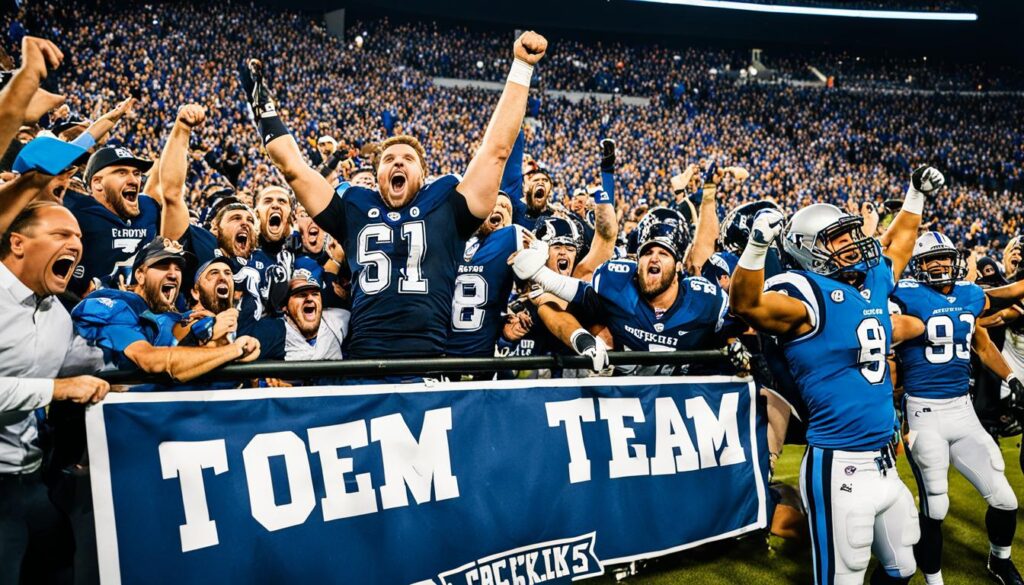Did you know that in sports betting, underdog bets can sometimes yield higher returns than betting on overwhelming favorites? It’s true! This surprising fact is often overlooked in the high-stakes world of betting where everyone seems to chase the favorites. While the concept of utilizing low odds betting strategies, especially focused on the underdog advantage, attracts many gamble enthusiasts looking to outsmart the bookies. But betting on underdogs, the ones expected to lose, isn’t just about the adrenaline rush. It’s about the potential for bigger betting profits and exploiting the inefficiencies in the gambling markets.
The skeptical eyebrows often raise when we talk about consistently profitable betting strategies. People question the concept due to its high risk and low probability nature. But interestingly, DJ Loutsch’s research indicates that varied implementations of the home-underdog theory did not yield consistent year-over-year profits, challenging the notion of a foolproof gambling strategy against NFL sports gambling markets. Is there still something to take away from it? Read on to find out!
- Key Takeaways:
- What Constitutes a Low Odds Bet?
- The Psychology Behind Betting on Underdogs
- Bookmaker Pricing Strategies and Biases
- Analyzing Historical Betting Data for Edge
- Interpreting Betting Percentages and Odds Movements
- Capitalizing on Herd Behavior in Sports Wagering
- Consistently Beating the Vigorish in the Long Run
- Finding Value in Low Odds: An Analytical Approach
- Historic Wins Against the Spread: A Closer Look
- Home Underdogs: Analyzing a Decade of NFL Data
- Bankroll Management for Low Odds Betting
- Selective Betting: Choosing the Right Games and Odds
- What Constitutes a Low Odds Bet?
- What is the Psychology Behind Betting on Underdogs?
- How do Bookmaker Pricing Strategies and Biases work?
- What value can be derived from Analyzing Historical Betting Data?
- How to interpret Betting Percentages and Odds Movements?
- How can one Capitalize on Herd Behavior in Sports Wagering?
- How can one consistently Beat the Vigorish in the Long Run?
- How to Find Value in Low Odds through an Analytical Approach?
- What role does Bankroll Management play in Low Odds Betting?
- What factors need to be considered while Selectively Betting?
Key Takeaways:
- Underdog betting can sometimes yield higher returns than betting on favorites.
- Low odds betting strategies can be an interesting approach to outsmart bookies and maximize betting profits.
- Understanding gambling market inefficiencies is crucial to employ effective betting strategies.
- Consistently profitable betting strategies exist but require a deep understanding of the game and careful application.
- The home-underdog theory, although not consistently profitable year-over-year, can offer insights into exploiting the sports betting markets.
Exploring the Underdog Advantage in Sports Betting
The underdog advantage in sports betting offers a unique perspective to bettors, providing a betting edge by capitalizing on market inefficiencies. This concept stems from the idea that the seemingly overlooked or underrated teams can actually present more profitable betting opportunities.
The principles of the underdog betting strategy were put to the test by DJ Loutsch in the NFL sports betting market, specifically focusing on the effectiveness of the home-underdog theory. The aim was to uncover trends or patterns that could potentially be leveraged to predict future outcomes.
Loutsch’s research yielded some insightful findings. Of the five different variations of the home-underdog theory tested over a decade, none showed consistent success year on year. However, individual instances were profitable, highlighting possible areas of sports betting market inefficiencies.
This lack of uniformity across the years goes a long way in illustrating the dynamic nature of sports betting markets. It underscores the adaptability of bookmakers, who notably adjust odds and strategies to ensure their own profits. This constantly shifting arena ensures that historical success with certain strategies may not always guarantee future victories, reflecting the intricate, unpredictable, and intriguing nature of the betting markets.
“Despite the variations, none of the strategies showed consistent profitability year after year, providing a testament to the bookmakers’ ability to adapt and refine their tactics.”
| Approach | Findings |
|---|---|
| Home-Underdog Theory | Some profitable instances, inconsistent year on year |
| Other Variations | No consistent profitability |
In summary, while exploring the underdog advantage in sports betting doesn’t provide a foolproof strategy, it does reveal the interesting interplay between bettors and bookmakers within the marketplace. It emphasizes the importance of continual research, adaptation, and innovation in formulating betting strategies that can potentially take advantage of the ever-evolving dynamics of sports betting market efficiency.

Defining Low Odds Betting Strategies
In the world of sports betting, gamblers employ strategies that give them an edge. Understanding low odds bets and the psychology behind betting strategies can help better navigate the betting market. Let’s delve into these concepts.
What Constitutes a Low Odds Bet?
A low odds bet is one where the outcome is perceived as more likely to occur, hence offering shorter odds and lesser returns. This perception of safety is the major draw, although these bets require higher success rates to yield substantial profits due to their modest payoffs.
The Psychology Behind Betting on Underdogs
Gambling psychology plays a significant role in the tendency for bettors to favor underdogs. The potential for significant returns from long-shot bets presents an attractive lure. Additionally, it has been noted that bookmakers often exploit these biases, setting their lines to capitalize on tendencies toward favorites, particularly those playing away.
Understanding these aspects of betting psychology can aid in developing more effective gambling strategies. Betting strategy isn’t just about understanding the game, but also about understanding the human element.
Overturning the Bookies: Understanding Market Inefficiencies
Successful sports betting calls for a comprehensive understanding of the inherent market inefficiencies. Discerning bettors consciously strategize about how to constantly stay a step ahead of bookmakers. This section delves into the bookmaker pricing strategies, biases, and the role historical betting data plays in offering an edge to gamblers.
Bookmaker Pricing Strategies and Biases
In his illuminating research, Levitt brings to light the clever tactics bookmakers employ to maximize their profit. Rather than setting point spreads aimed at equalizing money on both sides, bookmakers often exploit bettor biases. By skewing the odds in favor of expected favorites, bookies manage to secure a lion’s share of dividends. This underlines the strategic manipulation of public betting patterns by bookmakers, prodding them towards certain predictable behaviors
Analyzing Historical Betting Data for Edge
Historical betting data offers an enlightening perspective on habitual market patterns. The past record of home underdogs in the NFL paints a fascinating picture. More often than not, they outperform, beating the spread against road favorites. Such consistent anomalies indicate potential inefficiencies in how odds are set by bookmakers. Shrewd bettors can analyze such patterns, to capitalize on these opportunities and maintain an upper hand in their betting pursuits.
| NFL Season | Home underdogs | Road favorites |
|---|---|---|
| 2016 | 60% | 40% |
| 2017 | 58% | 42% |
| 2018 | 62% | 38% |
| 2019 | 59% | 41% |
| 2020 | 61% | 39% |
The above data evidences how home underdogs consistently outshine their road favorites counterpart in NFL, adding to the arsenal of a bettor’s strategy.
Home-Underdog Theory: A Gateway to Higher Profits?
At the heart of innovative betting strategies, you’ll often come across the home-underdog theory, prevalent amongst punters keen to drive their betting profits up. This theory suggests that home teams performing as underdogs might present lucrative opportunities, stemming from an exciting combine of the undeniable home advantage and the market undervaluation of these teams.
Yet, when subjected to close scrutiny, such as through Loutsch’s rigorous analysis, the profitability of this theory doesn’t seem to reveal a constant pattern. Over several NFL seasons, it demonstrated periods of both losses and gains, failing to uphold the premise of continual positive returns.

However, this doesn’t mean that the theory holds no weight in the gambling theory ecosystem. On the contrary, these inconsistencies open doors to broaden the understanding of how market dynamics impact the application of betting systems, emphasizing the need for adaptability and finesse in betting procedures. Thus, the home-underdog theory remains an arena of ongoing exploration for bets looking to leverage specific market conditions where it might hold true.
Contrarian Betting: Gauging Public Sentiment for Low Odds Success
Contrarian betting involves leveraging public sentiment to identify high value betting opportunities. This strategy is dependent on accurate interpretation of betting percentages and tracking of odds movements. Additionally, understanding and capitalizing on herd behavior in sports wagering can also provide viable avenues for profitable betting.
Interpreting Betting Percentages and Odds Movements
A critical aspect of contrarian betting involves understanding where the majority of the public is placing their bets and observing how this influences odds movements. The aim is to identify opportunities to bet against the trend, especially when betting patterns favor favorites disproportionately. By going against the grain, bettors can oftentimes find odds that offer far better value than at first glance, yielding more lucrative outcomes.
Capitalizing on Herd Behavior in Sports Wagering
Herd behavior has been observed influencing betting markets significantly. Evidence suggests that underdogs, particularly significant underdogs, are underpriced due to the public’s preference to back popular, winning teams. This herd mentality can open up excellent opportunities for contrarian betting, as betting against such biased trends can reveal undervalued opportunities.
| Contrarian Betting Strategy | Description |
|---|---|
| Betting Against Public Favorites | This strategy involves placing wagers on options that are not popular amongst the majority of bettors. Often, these are underdogs in a competition. |
| Monitoring Odds Movements | This involves keeping a close watch on how odds change in response to public betting patterns and leveraging those shifts to find value. |
| Capitalizing on Herd Behavior | This strategy requires understanding and exploiting the public’s psychological tendency to back known winning teams, which can lead to attractive betting opportunities on lesser favored options. |
Low Odds Betting Strategies: Profiting from Minimal Risk Bets
As we delve deeper into the fascinating world of low odds betting, it’s clear how essential it is to reduce risk and optimize possible returns on bets. There are two critical aspects for those endeavoring to consistently profit from minimal risk bets: consistently beating the ‘vig’, or house advantage, and finding value within low odds through a rigorous analytic approach. Both these elements working in tandem can provide value betting opportunities with impressive returns.

Consistently Beating the Vigorish in the Long Run
For long-term success in betting, strategies must factor in the commission, or ‘vig’, charged by bookmakers. In order to profit, one’s winning percentage must exceed the house advantage. Levitt’s study found that home underdogs and road underdogs have managed to outperform betting expectations, hinting at strategies that can override the vigorish over time. This fact only underscores the value of defeating the vig and the necessity for it within a successful low odds strategy.
| Types of Underdogs | Outperforming Expectations |
|---|---|
| Home Underdogs | Yes |
| Road Underdogs | Yes |
Finding Value in Low Odds: An Analytical Approach
The key to spotting value in low odds is the meticulous examination of data and market trends. The act of value betting involves careful analysis of scenarios where favorites cover the spread less than anticipated and the tendency of bettors to place bets on these favorites. By identifying and harnessing these patterns, value can be unearthed in select low odds situations.
- Identify favorable circumstances based on the past performances of underdogs.
- Analyze market trends and individual game statistics to predict future outcomes.
- Place bets on underdogs when the analyzed data suggests it.
By consistently beating the vigorish and finding value in low odds through systematic betting analysis, one stands a solid chance of generating consistent profits from low-risk bets.
Profitable Case Studies: When Low Odds Betting Prevails
Discovering the complex seas of sports betting is often illuminated by the lens of historical case studies. Beneath the microscope of data-driven analysis, certain instances stand out, not merely as anomalous exceptions, but as revealing glimpses into the subtle workings of the betting landscape. Let’s dive into these narratives to uncover when and how low odds betting strategies have triumphed.
Historic Wins Against the Spread: A Closer Look
Contrarian strategies, which occasionally advocate for betting on underdogs, have managed to score notable victories in the past. In fact, such instances have managed to bust widespread myths about betting, reshaping the understanding of what constitutes a good bet and how odds work. While these cases don’t form a rule, they certainly highlight the potential profit margins of adopting a contrarian stance in select scenarios.
Home Underdogs: Analyzing a Decade of NFL Data
DJ Loutsch, in his comprehensive examination of a decade worth of NFL betting data, evidenced the occasional advantage of betting on home underdogs. While the theory wasn’t consistently profitable year after year, it did present gains in specific contexts, suggesting that, under certain conditions there are chances to exploit perceived market bias. The insights drawn from this case study serve to refine the adopted strategies, correctly anticipating when it could be more profitable to go against the grain and place a bet on the underestimated teams, winning against the spread.
Taking Action: Practical Applications of Low Odds Strategies
It’s time to turn theory into action. Let’s delve into the practical aspects of implementing low odds strategies. The two key elements in this quest are effective bankroll management and the strategic practice of selective betting. These pillars set the groundwork for applying these betting strategies successfully.
Bankroll Management for Low Odds Betting
The cornerstone of any practical betting application is the establishment of robust bankroll management. Just as any resource would be managed judiciously, one’s betting bankroll must be managed with care. This ensures that no single bet can leave a lasting negative impact on the total capital, safeguarding against the inevitable downswings in sports betting.
“The key with any bet, especially with low-odds bets, is not to see it as a fast track to significant profits. Wins come slowly and steadily, requiring patience and strategic bankroll management.”
Let’s explore some key principles within bankroll management:
| Principles | Description |
|---|---|
| Staking plans | One must decide a uniform amount to wager on every bet, typically between 1% to 5% of the bankroll. Stick to it strictly, adjusting the wager size only when the bankroll increases or decreases significantly. |
| Risk management | Avoid chasing losses or getting carried away by wins. Maintain consistency in your staking plan, irrespective of previous results. |
| Record-keeping | Keeping a detailed record of bets can help identify trends and areas for improvement. Predictions, outcomes, reasons for betting, and other notes related to each bet should be documented. |
Selective Betting: Choosing the Right Games and Odds
Another pillar in practical betting applications is selective betting. This involves choosing odds and games based on specific criteria and thorough analysis, rather than simply trying to bet on every game. The aim here is to identify games and odds that offer value.
Selective betting can draw on various factors, including team form, recent head-to-head results, and playing circumstances. This approach aligns specifically with low odds strategies, focusing on betting on underdog teams in favorable situations. A selective bettor would, for instance, seek instances where the underdog is playing at home and the popular sentiment is heavily favoring the away team, increasing the potential returns on a successful bet.
Maintaining Discipline: The Key to Longevity in Betting
The sustainability of sports wagering is not solely dependent on winning or losing bets. Rather, it hinges on your betting discipline. Without it, even the best betting strategies can unravel, leaving you in a cycle of losing wagers. Let us uncover the importance of a disciplined approach to betting and how it can significantly contribute to your wagering longevity.
First and foremost, as a bettor, a steadfast commitment to your chosen strategy is crucial. Consistency in applying your principles and plans can turn the odds in your favor. Moreover, remaining resistant to impulsive decisions regardless of wins or losses can contribute greatly to your overall betting mindset.
Betting is not a get-rich-quick scheme; instead, it requires patience and understanding of the long-term nature of sports wagering. Embracing this mindset empowers you to maneuver through the unavoidable highs and lows that come with betting.
“Recognizing that no single strategy offers guaranteed returns is the key to maintaining discipline in betting.”
Essentially, the discipline in betting extends beyond selecting the right strategies and bets. It involves managing your winnings and losses effectively, refraining from chasing losses, and understanding that measured growth is part of the process. Remember, the tortoise won the race, not by speed, but by consistent effort.
It is safe to conclude that betting discipline, the right betting mindset, and understanding the long-term nature of wagering are the founding pillars of wagering longevity. Bet smart, and happy betting!
Conclusion
In summing up the exploration of low odds betting strategies, and specifically, the underdog betting approach, they present an appealing methodology for bettors seeking to outmaneuver bookmakers and grow their betting profits. Such strategies have shown potential to offer a rewarding return in cases where the market tentatively presents an exploitation opportunity.
Of course, the profitability of these strategies may vary with market dynamics, emphasis must be placed on maintaining a disciplined betting attitude. Adopting a comprehensive bankroll management looking for value in the odds, engaging in selective and data-driven wagering are all part of building a sound betting practice.
The success of these strategies greatly relies on the bettor’s understanding of betting psychology, identification of market inefficiencies, and keen utilization of historical data. By incorporating these key factors, bettors can tune their strategies for maximized potential long-term gains and unlimited betting success.
In this betting conclusion, the key is not just in the strategy employed, but in using calculated and data-backed decisions, constantly adapting to the dynamic betting market, and maintaining discipline in the betting course for those valuable, strategic insights. Here’s to betting with insight, strategy, and a disciplined approach!
FAQ
What Constitutes a Low Odds Bet?
A low odds bet is characterized by a bet where the potential outcome is perceived more likely to occur, hence offering shorter odds and lower returns. These bets are generally considered safer but require a higher success rate to be profitable due to the lower payoffs.
What is the Psychology Behind Betting on Underdogs?
Betting on underdogs plays on psychological biases where gamblers exhibit a preference for long-shot bets with the potential for significant payouts. Studies suggest bookmakers exploit bettor biases towards favorites, particularly those playing away, enabling them to set lines that capitalize on these tendencies.
How do Bookmaker Pricing Strategies and Biases work?
Bookmakers are known to leverage bettor biases for profit by setting point spreads that don’t always balance the money on both sides. This allows bookies to earn more from skewed betting towards favorites. This suggests that bookmakers deliberately exploit public betting patterns rather than aiming for balanced books.
What value can be derived from Analyzing Historical Betting Data?
Historical betting data offers valuable insights into consistent market trends. For instance, home underdogs in the NFL have been shown to beat the spread more often than road favorites. This indicates potential inefficiencies in bookmakers’ odds that bettors can potentially exploit.
How to interpret Betting Percentages and Odds Movements?
By analyzing where and how the majority of the public is betting, and how odds move in response, bettors can identify opportunities to bet against the grain when betting patterns show a disproportionate amount of wagers placed on favorites.
How can one Capitalize on Herd Behavior in Sports Wagering?
Evidence suggests that herd behavior impacts betting markets, and that significant underdogs are underpriced due to the public’s tendency to back popular, winning teams. Betting against such biases can reveal undervalued opportunities.
How can one consistently Beat the Vigorish in the Long Run?
To achieve long-term success in betting, a strategy must factor in the commission (vig) charged by bookmakers. Certain studies have found that home underdogs and road underdogs have managed to outperform betting expectations, hinting at strategies that can overcome the vigorish over time.
How to Find Value in Low Odds through an Analytical Approach?
An analytical approach to low odds betting involves a meticulous examination of data and market trends. By assessing scenarios where favorites cover the spread less than anticipated and the tendency of bettors to still back favorites, value might be found in select low odds situations.
What role does Bankroll Management play in Low Odds Betting?
Effective bankroll management is crucial when applying low odds betting strategies. By defining bet sizes and imposing strict limits, bettors can mitigate risks and ensure they are well-prepared to capitalize on favorable betting opportunities.
What factors need to be considered while Selectively Betting?
Selective betting stresses the importance of rigorous game and odds selection based on comprehensive analysis and strategic insights. This targeted approach aligns well with betting on underdogs at home, where bettors look for specific situations that offer higher odds for success.

